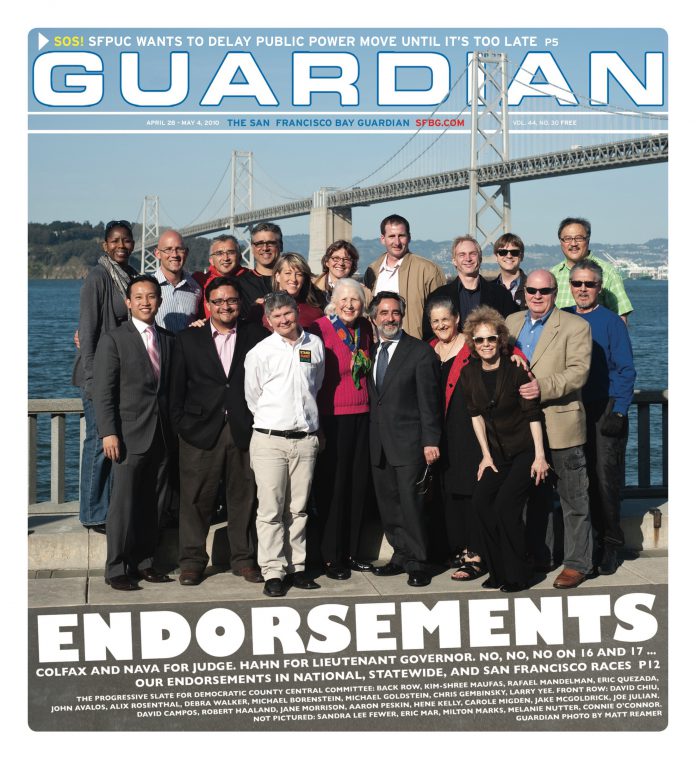arts@sfbg.com
STAGE A man gets off work one hot summer day and stops at the supermarket for an air-conditioned diversion, buys a bag of cherries, and on the way out of the parking lot rolls over a woman with his Toyota Corolla. This is not a good way to meet people. But wham, crash, a relationship is born nevertheless. Not necessarily a romantic one, but then not so far away either. In Lydia Stryk’s An Accident, which closes the current season at the Magic Theater, guilt-ridden driver Anton (Tim Kniffin) and paralyzed patient Libby (Arwen Anderson) dance metaphorically and literally around one another like two lovers in a bad breakup. If only the complex collision between their respective pasts, personalities, and shared trauma angled off in our direction a little more. As drama, An Accident ranks disappointingly as a fender-bender.
This is surprising, not only because Stryk reportedly draws here in part on her own experience as the victim of a similar accident, but given the built-in intensity of the situation, which the playwright aims to heighten by keeping the rest of the world off stage. Her two protagonists have exclusive domain over the hospital room — where Libby remains rooted in bed, unable to move her body, her prognosis uncertain, and Anton slumps in a corner chair or moves frenetically about, trying to please, atone, heal (the both of them). The only other setting, until the very end, is a park bench just outside (set downstage in shadow) where Anton initially sits frozen in contemplation before addressing the audience about the day of the accident.
Moreover, Libby, who also addresses us at the outset, is suffering temporary amnesia, and is thus a "missing person" with no one else in the world as far as she knows. Anton, for his part, is a bit of a loner too, a divorced high school history teacher and Civil War buff, a bookworm and library stalker, with a grown daughter in medical school probably not much younger than Libby. In other words, he’s a guy in his head most of the time, confronted with the broken body of a young woman suddenly trapped in her own thoughts and glaring back angrily at his brazenly healthy physique.
The realism is heavily sculpted by this ideal, almost laboratory-like distillation. Director Rob Melrose and scenic designer Erik Flatmo even forgo the usual hospital equipment, sounds from the corridor, or any view beyond the large wall-size windows, which remain hidden by drawn blinds. Indeed, Flatmo’s set — one of the more impressive transformations of the Magic stage in recent memory — recedes enticingly with sloping ceiling and hard angles into the very idea of institutional isolation, rather than some real-world approximation.
Again, such an intense focus promises us something, namely intensity. But that is decidedly lacking. The actors are very expressive — Anderson’s vigorous, slightly zany performance being all the more impressive given the heavy restrictions on her movement — but the tone is oddly noncommittal, a lightness confounding even the ostensibly heaviest of scenes. The gruesome physicality of their encounter comes across in the dialogue, where the details of Libby’s injuries come to light, but the impact, so to speak, remains marginal. At times it seems as if too much realism were forgone: when Anton, desperately and slightly ridiculously pursuing a healing "life force" energy technique, obeys Libby’s command to remove her hospital gown to maximize his effectiveness, we see her body pristine rather than badly beaten, bruised, and surgically scarred.
One ruefully recalls, in way of contrast, Caryl Churchill’s A Number or David Harrower’s Blackbird. These are similarly distilled two-person dramas where the concentrated isolation of characters locked in deeply traumatic relation to one another comes off to much greater effect, laying both parties bare while digging deeply under our own skin. Unlike the characters in either of those plays, and in an intriguing twist, Libby and Anton have no mutual past predating the collision itself, so their individual pasts come to color and inform this backward relationship that begins in trauma and pain. It’s an opportunity that should have led further, but An Accident plays it all too safe.
AN ACCIDENT
Through May 9
Wed.–Sat., 8pm (also Sat., 2:30 p.m.);
Sun., 2:30 p.m., $25–$55
Magic Theatre, Bldg D,
Fort Mason Center, Marina at Laguna, SF
(415) 441-8822

